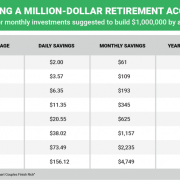Navigating the ever-changing financial landscape can be complicated and confusing. Most people want to invest and plan for their future, but they don’t know how. From understanding stocks and bonds to retirement accounts, it can quickly become overwhelming for the average person.
According to the Investment Advisor Association’s 2024 report, demand for investment management services has continued to grow, with the number of clients reaching 56.7 million in 2023, a record high.
Many people end up with various investment accounts–a couple of 401ks from previous jobs, an IRA, or perhaps some stocks purchased after a few too many convincing financial influencer videos. Or maybe you’ve been investing for years and are unsure how to meet your financial goals ultimately. Either way, investment management can help guide you.
Key Takeaways
- Investment managers manage a client’s investments and assets on their behalf.
- An experienced investment manager will know how to diversify a client’s assets, and how to navigate challenging financial situations.
- While there are inherent risks associated with trusting a third party with your investments, qualified investment managers are well-equipped to mitigate these risks.
- While it is possible to manage your investments, many people find employing a manager saves them time, energy, and money in the long run.
What is Investment Management
Investment management is the handling of an investment portfolio, which is a set of financial assets that can include stocks, bonds, cash and other alternative portfolio investments. It generally involves creating both short and long-term investment strategies, buying and selling assets, asset allocation, developing a tax strategy and more.
If these tasks seem daunting, hiring a professional investment manager could be the right choice for you. Investment managers conduct in-depth research and analysis on investment tools and market trends, leveraging years of expertise to inform their strategies.
The terms “portfolio” and “asset management” are often mentioned in the same conversations, but these options are more narrowly focused while investment management takes a more holistic approach. Investment managers not only manage portfolios, but also assist in creating investment goals, determining an individual’s risk tolerance and conducting ongoing portfolio management, asset allocation and portfolio rebalancing.
Benefits of Investment Management
Investment management can be helpful in several ways depending on your individual goals, including growing your wealth, strengthening your portfolio and reducing your tax burden.
Wealth Growth and Preservation
Wealth growth is accomplished using financial strategies to grow your net worth over time, and wealth preservation is about keeping the assets you already have safe. There are key strategies for both growth and preservation, and investment management can help find the right balance for individual situations based on personal goals and risk tolerance.
Diversification and Risk Reduction
The primary purpose of portfolio diversification is to control risk. Generally, many small investments are considered safer than one large investment. By diversifying your portfolio into smaller individual investments, you suffer a smaller loss if one fails.
Optimized Returns and Tax Efficiency
Taxes are unavoidable, but the right investment strategy can help reduce your overall tax liability over time. Investment managers can help by using strategies such as maximizing contributions to tax-deferred accounts, holding investments to avoid higher taxes on short-term capital gains and tax loss harvesting.
Financial Security and Goal Achievement
Ideally, having your investment portfolio optimized by your investment manager will help create security through economic downturns and account for inflation. A well-managed portfolio will allow you to meet your financial goals over time.
Challenges of Investment Management
Investment management is not without challenges, especially when handling your finances on your own. Horizons Wealth Management offers a variety of wealth management services, working with you to develop an individual investment plan tailored to meet your goals.
Market Risk
Whether managing finances on your own or with an investment manager, market risk is always a concern. Market risk, also known as systemic risk, is the possibility of loss due to factors that affect the market. These factors include changes in stock prices, interest and exchange rates and political and economic situations (e.g. a recession).
Credit Risk
Usually, bonds are considered a lower-risk investment. However, that does not mean they are risk-free. One of the main risks for bond investors is credit risk, which is the chance that a borrower fails to pay or meet the agreed-upon terms of a loan.
Liquidity Risk
Liquidity refers to how easily an asset can be converted to cash. When markets become or are predicted to become volatile, your first instinct may be to liquidate your assets to cash.
However, this may not be the best option for achieving long-term goals. It’s difficult to know what the right choice is. Even professional investment managers cannot predict the future, but an experienced manager will have a toolbox of strategies to use in times of uncertainty.
Diversification & Concentration Risks
While diversifying your portfolio is generally considered safer than having concentrated assets, diversifying without proper research and understanding can also lead to loss. Conversely, some people concentrate their investments based on internet trends or advice from financial influencers, frequently leading to losses.
Behavioral and Regulatory Risks
Regulatory risk involves loss stemming from changes in regulations that affect a market, sector, business, or asset. The average person may not keep up with regulatory changes, and even with the information legal language can be difficult to understand and apply to your situation.
When to Hire an Investment Manager
Many people find themselves with several investment accounts—these could be from old jobs, family members or stocks purchased online. Or perhaps you have been intentionally investing for years and want to ensure you’re making the right choices.
Whatever the source, investment management can be beneficial if:
- You are dealing with complex financial matters, such as tax strategy, inheritance planning, or retirement planning.
- You are not certain about making investment decisions on your own, or would like a professional second opinion.
- You want a service that can help manage other financial needs outside of portfolio management.
- You want someone else to manage your portfolio, rebalance assets, and provide guidance on updating your investment strategy over time.
- You have experienced a significant change in income or a major life event, such as getting married, getting divorced, or having a child.
How to Choose an Investment Manager
When selecting an investment manager, several key factors should be considered, including their credentials, reviews, fee structures, and alignment with your personal financial goals and risk tolerance. A good place to start is by creating a list of your financial goals, ensuring the investment manager’s strategy aligns with your individual needs and circumstances.
For example, are you new to investing? Do you already have many assets and need someone else to keep tabs? Are you looking on behalf of yourself or on behalf of an organization you’re part of? Do you know what specific areas you need help in?
Finding the right match requires understanding your goals and aligning them with a manager who fits your needs.
Is an Investment Manager the Same as an Advisor?
An investment manager is one type of financial advisor. Investment managers, portfolio managers, investment counselors, asset managers, and wealth managers all fall under the umbrella of financial advisors. Investment managers primarily deal with financial assets, such as stocks, bonds, and other securities. In contrast, financial advisors provide a broader range of services that encompass all aspects of an individual’s finances, including early retirement planning.
Bottom Line
Investing can quickly become overwhelming and complicated, leaving many people unsure of how to achieve their financial goals. This doesn’t mean you have to give up–professional investment management can help guide you. Horizons Wealth Management provides comprehensive financial planning, wealth management, portfolio management, and retirement planning services to help you navigate your investments and achieve your financial goals.
Investment Management FAQs
Is an investment manager the same as a financial advisor?
No, investment managers focus specifically on assets such as stocks, bonds, and other securities and how to use them to achieve financial goals. Financial advisors have a broader scope, looking at all aspects of an individual’s finances.
Is a financial advisor the same as a portfolio manager?
Financial advisors may provide advice on a client’s portfolio but typically deal in broader areas that encompass all aspects of financial planning. Portfolio managers are focused on advising, buying, holding, selling, and rebalancing client assets.
Do you need to hire a certified financial planner for investment management?
A CFP accreditation is not required to become an investment manager. However, the certification educates professionals on over 100 topics of financial management, ensuring they are educated in any areas or issues a client may have.









